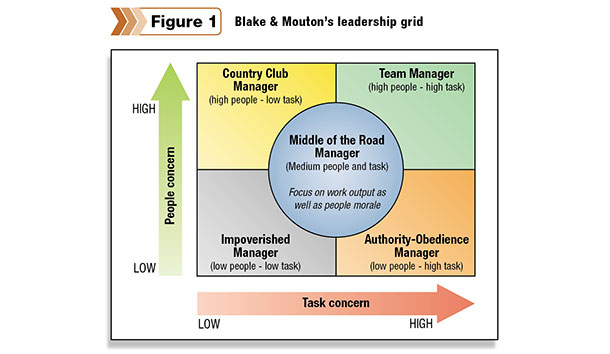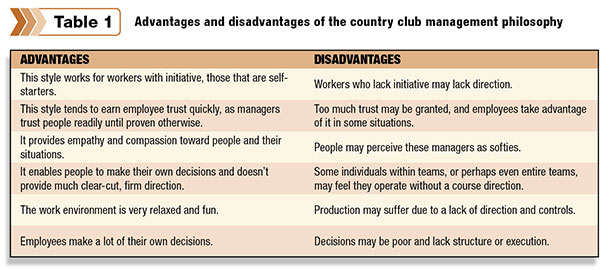Editor’s note: This article is part of a series of articles to review the four most common management philosophies that dairy managers employ. The first article in the series appeared here and reviewed the authority-obedience philosophy.
Remember Jake, the hypothetical dairy manager from Indiana with a country-club management style that we described earlier in the year? (Click here to read this article.) Remember, he has the highest concern for people and employees, and his key management philosophy is to educate, enable and empower. Well, consider this situation he’s found himself in.
Jake’s right-hand man is Pedro, who has been with him since the early 1990s. Pedro came into the office this morning and asked Jake if he could borrow $6,000. This happens often, like three or four times a year. It drives Jake crazy, particularly because he can’t say no to Pedro.
But it gets worse: Other people who work on the dairy, and a few of Jake’s friends, have also borrowed money over time. A few of them never paid him back. Jake can’t muster the courage to go ask for his money.
All in all, Jake and his family are OK financially, but these situations certainly cause Jake some grief with his wife. She tells him he doesn’t have a backbone to stand firm when these things arise. It’s not the only thing that gets in Jake’s way. He is a nice guy. Ever since he can remember he has bent over backwards to help people, but the costs have been high: People have walked all over him.
For example, just recently he took some time off with his family, leaving a list of items that needed to be caught up – not complicated. But upon his return, he found out that only half of his list was done. After learning of the undone items while talking with Pedro, he said: “I guess I will have to do it myself; that’s why I don’t like going on vacation.”
You get the point. Jake is a manager who firmly believes in the best of people; his management philosophy is strongly oriented toward people. But what about tasks? Is he too focused on people to pay attention to the task side of the dairy?
Jake’s style of leadership is most concerned about the needs and feelings of the members of his team. You can see it in his actions. Managers like Jake operate under the assumption that as long as team members are happy and secure, they will work hard. What tends to result is a work environment that is very relaxed and fun but where production suffers due to lack of direction and control.
Managers with a country-club management philosophy toward people come across as sensitive, free-willed and people-focused. The purpose of this article is not to pick on or ding this philosophy or style of management.
What you focus on gets your energy, and focusing heavily on people can help you achieve your goals, but it has its challenges, too. The advantages and disadvantages of this management philosophy or management style are listed in Figure 1.

If this is your management philosophy, it has surely gotten you somewhere – but not with every situation. If you want is to improve your leadership, then flexing your style will be a great start toward more effective leadership. Consider the management styles closest to your style in Blake and Mouton’s leadership grid. (These management styles will be covered in more detail in future articles.) Consider these suggestions for rounding out your management style.
Be a self-aware manager
In a previous article, we talked about metacognition, the ability to be aware of your own thinking. In my coaching work, I support my clients in developing their ability to become more and more conscious of themselves, their thoughts, their emotions and their actions, particularly as they impact their management philosophy. Only managers who work on becoming more self-aware, and consider changes to their particular management style, will move toward more effective leadership.
For the country-club-style manager, thinking about your own thoughts allows you to take charge of the situation and balance your own needs with the requests of others.
Take, for example, the situation where Jake was asked to loan money to employees or friends. Every time he is in such a quandary, he might take just a bit more of an inward look at himself and his thoughts. It’s OK to slow down the situation and think about it.
As he takes time to be introspective about his thoughts and emotions, he may change his approach. He’s more likely to say definitively, “I can’t right now.” Or he may say, “Let me think about it, and I’ll have an answer for you tomorrow.” Either of these responses put him in a more empowered position.
Set limits
The country-club manager’s focus on concern for other people makes him or her dedicate less focus toward tasks. Therefore, these managers have a hard time setting limits with people.This style of manager at least needs to work on setting definitive tasks, and the expectations of both quantity and quality, employees must deliver. Setting limits, completion timelines and consequences for not accomplishing these will help this manager affect productivity.

Be firm and straight to the point
When your management philosophy is like that of a country-club manager, your tendency will be to be too soft on people and to expect them to take initiative and solve problems on their own. This might work with employees who are self-starters or who take initiative and don’t need their manager to be on top of them all the time.
However, it will not be as effective for your other employees. You can make your system more efficient by being less of a softy and more firm and straight to the point. This provides clarity for employees, and when they have clarity, they can execute more swiftly.
The fundamental ability you need to have at all times is deciding what situations and with which employees you need to be more firm and straight to the point, and what situations call for your natural style of empowerment and self-direction.
Be able to say ‘no’
The country-club manager’s body language, tone of voice, facial expressions and other non-verbal communications exude softness. Part of self-awareness starts here. You know the saying, “It’s not just what you say, but how you say it.” One key challenge for this manager is saying “yes” too often and not saying “no” or at least “not now” often enough.
This attribute relates to setting limits. In the example at the beginning of the article, Jake may want to say no but thinks he will disappoint others or ruin his relationship with them if he does. Country-club managers who start using “no” or “not now” and then negotiate, strategically, set better expectations and earn even more respect from the people around them.
Conclusion
As we mentioned before, becoming aware of your own management philosophy is the first step for any manager toward understanding how his or her style impacts those they manage. For country-club managers, be willing and open to set better limits with people, be more firm and straight to the point, and be able to say no.
These attributes will impact how clear you are with your employees and will empower them to be more effective executors, which is what you naturally desire. Be open to learning about and flexing into other management styles that support different situations in order to become a more effective leader. PD
ILLUSTRATION: Illustration by Corey Lewis.

-
Jorge Estrada
- Leadership Coaching International Inc.
- Email Jorge Estrada







